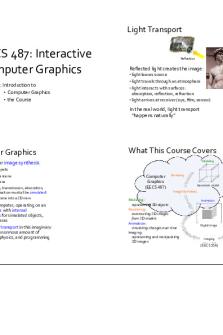Utopia - Lecture notes 1 PDF

| Title | Utopia - Lecture notes 1 |
|---|---|
| Course | EARLY MODERN LITERATURE |
| Institution | University of Surrey |
| Pages | 2 |
| File Size | 47.8 KB |
| File Type | |
| Total Downloads | 85 |
| Total Views | 142 |
Summary
Lecture notes from Thomas More's Utopia as part of the Early Modern Literature modern, second year semester 2....
Description
Utopia • Thomas More remains for the Catholic church the patron saint • Henry VII furious because More refused to attend the marriage to Anna Boleyn and was beheaded • Was born in 1478, father a lawyer and then later a judge and served as a paige to John Morton- Cardinal John Mortom in Utopia • Fluent in Latin, writing, reading and speaking • Utopia was originally written in Latin • More’s close friend: Desiderius Erasmus • 1504: more was respected as laywer • 1510: became representative of London in parliament • Accompanies Cardinal Wolsey to visit Charles V of the Holy Roman Empire Utopia: • Precursor to science fiction and Utopian fiction • Word means ‘no place/nowhere’ • Book is very ambiguous- some think it had radical intentions but had to distance himself from the text, others think it is a warning against Utopian fiction, and others think it is a satire • Nobody knows why he wrote it- out of boredom or as a serious text • Three main characters: • Thomas More- very conservative/moderate, whose final thoughts are very ambivalent • Peter Giles- as in real life, More’s friend who lives in Antwerp. He acts as gobetween for More and Raphael • Hytholoday- ‘talker of nonsense’- clue to the fact that Utopia is fiction, or as signal to reader that what he says can be ignored Raphael’s criticisms of England in Book 1: • The death penalty is too harsh a punishment for theft; it is better to ensure everyone has enough to eat • Thieves are created by unforgiving social and economic conditions, not by genuine moral choices • Maintaining big armies creates a lot of idle soldiers, who in bad times become cut throat thieves Features of Utopia in Book II: • Utopians have abolished property rights and money, because these are seen as root source of human greed- if there is no private property, men will no longer seek to do each other harm • All work is communal • No private space • All cities are the same because they have worked out a perfect system • Everyone wears same clothes • Farming is collectivised
• Women and work and take in education- 6 hour work day • Education is important • A select few are relieved of manual labour to become full time scholars • The arts, science, and logic are priorities • Fantastic healthcare, with ample space in the many hospitals • Such is their mastery of science, they can predict the weather • Happiness is very important, and for this they must turn to religion • Women can only marry at 18 and men at 22; no sex before marriage • Divorce only permitted in cases of abuse or adultery • Pubic officials serve for the common good • They are barred from campaigning from public office • There are few laws, and those which are written are clear • Punishment for crimes is slavery • Slaves are chained and work constantly • Cannot buy or sell a slave • Children are no slaves, but free citizens • Only other ways to become a slave is being captured in war, escaping the death penalty from another country Final thoughts on Utopia: • You should dare to question the status quo • Goal is to eliminate inequality, but in a trade for their individuality, privacy and freedom • More’s aim might be to make us wonder what our own Utopia might be and what we might trade for it Think of your own Utopia: • No inequality between men and women...
Similar Free PDFs

Utopia - Lecture notes 1
- 2 Pages

Utopia - Apuntes 1
- 4 Pages

Utopia celina
- 2 Pages

Lecture notes, lecture 1
- 9 Pages

Lecture notes, lecture 1
- 4 Pages

Lecture-1-notes - lecture
- 1 Pages

Lecture notes- Lecture 1
- 20 Pages

Lecture notes, lecture 1
- 4 Pages

Lecture-1 - Lecture notes 1
- 6 Pages

Lecture notes, lecture 1
- 9 Pages

CASO UTOPIA
- 29 Pages

1 - Lecture notes 1
- 11 Pages

1 - Lecture notes 1
- 5 Pages

1 - Lecture notes 1
- 1 Pages
Popular Institutions
- Tinajero National High School - Annex
- Politeknik Caltex Riau
- Yokohama City University
- SGT University
- University of Al-Qadisiyah
- Divine Word College of Vigan
- Techniek College Rotterdam
- Universidade de Santiago
- Universiti Teknologi MARA Cawangan Johor Kampus Pasir Gudang
- Poltekkes Kemenkes Yogyakarta
- Baguio City National High School
- Colegio san marcos
- preparatoria uno
- Centro de Bachillerato Tecnológico Industrial y de Servicios No. 107
- Dalian Maritime University
- Quang Trung Secondary School
- Colegio Tecnológico en Informática
- Corporación Regional de Educación Superior
- Grupo CEDVA
- Dar Al Uloom University
- Centro de Estudios Preuniversitarios de la Universidad Nacional de Ingeniería
- 上智大学
- Aakash International School, Nuna Majara
- San Felipe Neri Catholic School
- Kang Chiao International School - New Taipei City
- Misamis Occidental National High School
- Institución Educativa Escuela Normal Juan Ladrilleros
- Kolehiyo ng Pantukan
- Batanes State College
- Instituto Continental
- Sekolah Menengah Kejuruan Kesehatan Kaltara (Tarakan)
- Colegio de La Inmaculada Concepcion - Cebu

